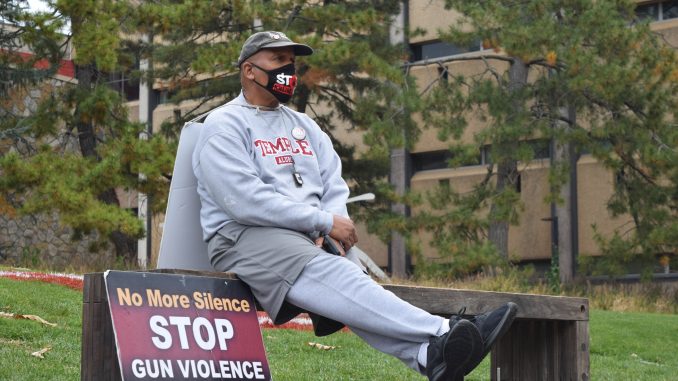
Updated 12/6 at 4:13 p.m.
Approximately 30 to 40 Temple University students, parents, community members and Pennsylvania State Senator Sharif Street gathered at the Bell Tower on Monday morning to rally for increased campus safety and against gun violence in light of the fatal shooting of Samuel Collington, a 21-year old senior political science major, on Nov. 28 on Park Avenue near Susquehanna.
Participants advocated for an increase in campus safety measures, a decrease in gun violence, the creation of a parent safety group to facilitate, greater Philadelphia Police Department involvement in campus safety issues and more dialogue between university administration and students and parents.
In her speech Monday morning, Virginia Jorgensen, the organizer of the rally and a parent of a senior biology major, proposed three angles for solutions to gun violence — a Temple solution, a student solution and a community solution.
In speaking about the Temple solution, Jorgensen reiterated President Jason Wingard’s Nov. 30 announcement to the Temple community detailing plans to increase the Campus Safety Services by 50 percent, work with Philadelphia Police to increase their off-campus presence, collaborate with city leaders to expand anti-violence initiatives, increase availability of FLIGHT — Temple’s shuttle program — and the security Walking Escort Program.
Temple was pleased with the strong engagement from parents at the rally, wrote Stephen Orbanek, in a statement to The Temple News.
“We welcome their voices and input as we all work together to find solutions to this very complex issue of gun violence, which is plaguing both Philadelphia and our nation,” Orbanek wrote.
Increased police presence is a double-edged sword, said Bishop Dwayne Royster, executive director of POWER Interfaith, in an interview with The Temple News on Dec. 1.
“That’s great for the students but it’s not addressing the systemic issue about why we have gun violence in the first place,” Royster said.
While an increased police presence may make some students feel safe, Black and Brown students may face implicit bias from an officer, he added.
For the student solution, five parents met and discussed their five point plan for campus safety with Temple Student Government this morning, said Billy Boyer, TSG’s chief of staff. The parents’ proposed plan included increasing FLIGHT’s availability and training students on community interactions at in-person orientation, Jorgensen said.
Other points included increasing police patrol by 50 percent and having Campus Safety Services work with the developing Temple Parent Safety Advisory Group on future initiatives, expanding Temple University Police Department’s patrol zones and improving safety infrastructure, like cameras and lights, she added.
Campus Safety Services will not expand its patrol zone at this time because they could face legal challenges, The Temple News reported.
“It was really productive, and I think the parents really understood the difficult nature of the situation that we’re in, that we have to balance the community’s needs with the student body’s needs,” Boyer said.
Radee Hammett, street outreach and a hospital responder with Philadelphia Ceasefire, a gun violence prevention organization, discussed the community solutions to gun violence. Hammett believes forming relationships with block captains and youth is a critical component in addressing and mitigating the gun violence in Philadelphia.
“There’s a disconnect between the community and the patrons that come back and forth to Temple,” Hammett said. “Cohesiveness no matter the color, Black, White, no matter the race, I think that once we build solidarity together with the community and the people that’s in the community and show that there is a level of care and love, then we can move to a higher place.”
Hammett also emphasized making employment and resume-building resources available to community members can encourage individuals to avoid crime and violence, he said. Hammett believes that an increased police presence can “bridge the gap” between the community and police and show that police have an interest in showing up for the community.
“It has come to a point where we don’t feel like our voices are being heard,” said Sean Mitchell, a parent of a sophomore art major. “We are here trying to have our voices heard.”
Attendees also heard from community members like Jamal Johnson, a gun control activist.
“The university and the city both need to align to try to address gun violence a lot more aggressively,” Johnson said. “Ultimately, everyone needs to be more welcomed into the conversation.”
Many bills promoting gun control, like Senate Bill 292, which bans assault weapons, have not gained much traction in the Republican-controlled legislature, Street said.
“There’s no bipartisan work or very little bipartisan support for, no meaningful bipartisan support, for gun control,” Street said.
Cindy Macsay, a parent of a freshman sport and recreation management major, is concerned about her son’s safety and believes focusing on the North Philadelphia community is an important step to reducing gun violence, Macsay said.
“Whatever programs they have in place to help the north side, they need to be enhanced,” Macsay said. “There’s things that need to be done to keep students as well as the community safe.”
It is important that the university invest in partnerships with community organizations focused on anti-violence and anti-gun work, as well as provide financial resources, expertise, research capabilities and tools and resources, Royster said on Dec. 1.
“Gun violence, violence in the community is the symptom, it’s not the disease,” Royster said. “I don’t think focusing directly on gun violence in and of itself is good, I think doing good solid community policing will help reduce the issue around gun violence.”


Be the first to comment